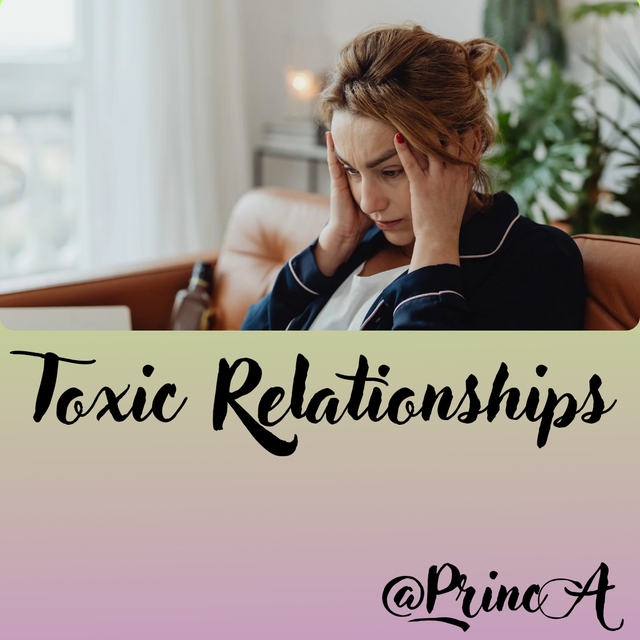Toxic Relationships ( Monday Feb 20, 2023 ) By @Princa
Greeting to all the lovely people of this community, how's everything going on, hope you're all doing well. I wanted to take a moment to say thank you to @chant & the entire @Steem-Cameroon team for putting together such a fantastic contest.

Designed In Canva

What is your understanding of a toxic relationship? Give some examples.
A toxic relationship is a relationship where one or both partners exhibit behavior that is harmful to the other person's mental, emotional, or physical well-being. Such a relationship can be detrimental to the people involved and can cause long-term damage if left unchecked.
Examples of toxic relationships may include:
Vituperative connections, in which one partner uses physical, emotional, or verbal abuse to exert control over the other.
Codependent relationships, where one partner is overly reliant on the other person for emotional or financial support, and the other person takes advantage of this.
Narcissistic relationships, where one partner is self-centered and demands constant attention and validation, while neglecting the other person's needs.
Controlling relationships, where one partner seeks to control every aspect of the other person's life, including their social interactions, finances, and daily routines.
Passive-aggressive relationships, where one partner uses subtle or indirect methods to express their anger or frustration, leading to a toxic and unhealthy environment.
Relationships with constant criticism, where one partner constantly criticizes and belittles the other person, leading to feelings of low self-esteem and worthlessness.
It is important to recognize the signs of a toxic relationship and seek help to address these issues.

Have you or any close friend ever been in a toxic relationship? Share your experiences.
Sorry, no experiences.

What are some Coping strategies for victims of a toxic relationship?
Coping strategies for victims of a toxic relationship can vary depending on the individual and the specific circumstances. Nonetheless, the following broad tactics might be useful:
Recognize that you are not responsible for the other person's behavior. It can be easy to blame yourself for the problems in the relationship, but it's important to remember that the toxic behavior is not your fault.
Practice self-care. Take time for yourself to do things that you enjoy and that help you relax, such as exercise, reading, or spending time with supportive friends and family.
Set boundaries. This can be difficult in a toxic relationship, but setting clear boundaries can help you protect yourself and establish a sense of control.
Seek support. Talk to a therapist, support group, or trusted friend or family member about your experiences. It can be helpful to have someone to listen and provide validation and support.
Focus on your own goals and interests. This can help you regain a sense of identity and purpose outside of the toxic relationship.
Practice mindfulness and self-reflection. This can help you become more aware of your thoughts and feelings, and can help you develop coping skills to manage difficult emotions.
Consider ending the relationship. If the toxic behavior continues and is causing you harm, it may be necessary to end the relationship for your own well-being. This can be a difficult decision, but it may be necessary for your own safety and happiness.

As a counsellor, what advice will you give victims of a toxic relationship?
As a counselor, here are some pieces of advice I would give to victims of a toxic relationship:
Recognize that you are in a toxic relationship: The first step is to recognize that the relationship is not healthy and that it is negatively affecting your well-being. Acknowledging this is crucial in making the necessary changes to improve your situation.
Seek support: Speak with someone you can rely on, such as a friend, family member, or therapist. It can be helpful to get an outside perspective and validation for your feelings.
Set boundaries: It's important to establish clear boundaries with your partner and communicate your needs. If your partner is unwilling or unable to respect your boundaries, then it may be time to re-evaluate the relationship.
Take care of yourself: Prioritize self-care and engage in activities that bring you joy and relaxation. This can benefit general wellbeing and stress reduction.
Consider ending the relationship: If the toxic behavior continues, it may be necessary to end the relationship. This can be a difficult decision, but remember that your well-being should always come first.
Seek professional help: If you are struggling to cope with the effects of the toxic relationship, consider seeking professional help from a therapist or counselor. They can provide you with additional support and guidance in navigating your situation.
Keep in mind that you deserve to be in a healthy, respectful relationship. Don't be afraid to reach out for help and support to create the change you need.

Excellent entry by you keep it up and best of luck🍀🍀